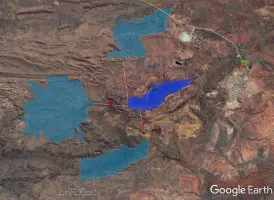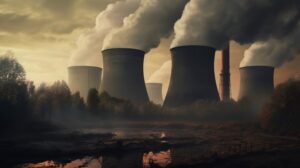Speculation is mounting in some quarters over just what exactly our freshly re-minted Prime Minister Kevin Rudd intends to do about “shifting the debate” on climate. Will he attempt to rekindle some of the magic from the heady days of Kevin ’07 through big, bold policy, or play it safe and hope that momentum alone sweeps him to victory at the next election?
Moving the date of the EU carbon trading linkage forward a year is unlikely to woo voters from the Abbott camp, and probably further entrench dislike from the Greens. If he wants to win hearts and minds, he’s going to have to do better than that.
If Kevin truly wants to capture the public’s imagination he should articulate a vision for the future and not shy away from directly addressing what’s becoming a very large elephant in the room: how that very same future may be jeopardised if we don’t get serious about climate.
After all, at its core, climate change is an ethical and moral problem for humanity. Potentially, that’s a strong motivator, but these days people are vigilant about not being manipulated by public relations spin. Some of us still remember how badly mismatched the CPRS was compared to the talk that came before it; if you’re going to roar like a lion, you can’t then act like a kitten.
Signaling a willingness to strengthen the 2020 national targets considerably (to at least 25%) may seem like political suicide, but a rare and believable display of authentic leadership would definitely accomplish the goal of shifting the debate.
Furthermore, it may put a spotlight on the limitations of Abbott’s scientifically-shaky “Direct Action” plan, a policy that even Malcolm Turnbull has called “bullshit”.
The time is right for this anyway. New research shows our last summer was most likely “angry” because of accumulated human emissions. CO2 levels are now at 400 parts per million, climatically a place the planet hasn’t been for millions of years. The Arctic sea-ice is still melting far faster than any model predicted, leading to massive changes in the polar jet-stream behavior, the consequences of which are only just beginning to be understood.
On top of all this, California is currently in the grip of one of its worst heat-waves ever recorded, while Arizona this week lost at least 19 firefighters in a fast-moving wildfire.
Back in Australia, the federal government’s own Climate Commission just released their latest update of the Critical Decade report, which didn’t mince words: “It is clear that global society must virtually decarbonise in the next 30-35 years. This means that most of the fossil fuel reserves must stay in the ground.”
Just let that sink in for a moment.
If true, the implications are profound. It would require nothing less than a total transformation of our energy usage: the way we produce, consume, trade, price and account for almost every ounce of fossil carbon and other greenhouse gases in every human endeavor. Creating a 100% clean electricity grid will seem like a straightforward engineering task in comparison.
Here in Australia, it would mean allowing our independent Climate Change Authority to set a carbon budget that’s tuned by the latest scientific evidence. Under such a regime, the price of pollution should become better aligned to the actual damage it causes.
Doing the maths would require deflating a carbon bubble the size of Wall Street – which could make the global financial crisis look like a quiet Sunday afternoon stroll. And it would mean doing all this while our weather gets more violent, hotter and unpredictable for decades to come.
Here’s the crux of the problem though: most of us are unwilling to question the prevailing mainstream subtext that the extent of such changes are simply not necessary nor desirable, even when faced with immense amounts of evidence to the contrary. Acknowledging the issue in its entirety would mean we have a responsibility to actually do something about it. True leaders are sorely needed right now to help us cut through our own denial.
Fortunately for us, something remarkable and hopeful happened last week while our leadership was reconfiguring itself, though it barely made the news here. Across the Pacific, a speech was made in Washington that may come to be seen as an historic turning point. Wiping sweat from his brow, Obama announced he was going to use his executive powers under the Clean Air Act to start imposing CO2 emission controls on new and existing power plants. At this stage, the policies themselves are modest, but it was a clear, unambiguous signal to the world that the US was finally going to take action on climate change. It was a seismic shift.
So for Mr Rudd, the timing really couldn’t be better. He has perhaps just one chance to seize the moment and make his now-immortalised words on climate change – “the greatest moral, economic and social challenge of our time” – so much more than just empty rhetoric.
Steve O’Connor is an ACF Climate Reality leader. He works with SolarShare Canberra creating a community-owned solar investment scheme. He tweets at @stevepoconnor









